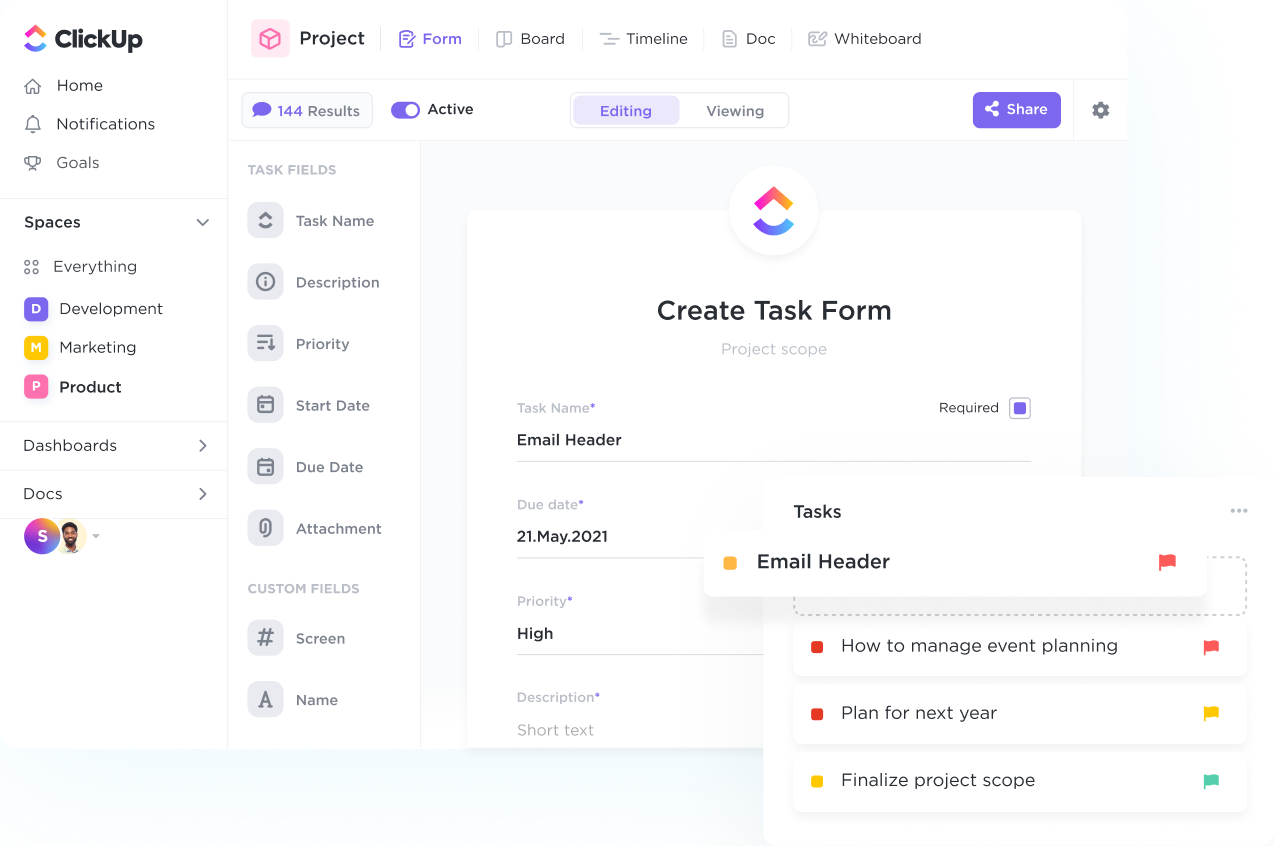CRM Views
See client relationships at a glance.
Manage everything from sales pipelines, customer engagement, and orders with ClickUp's 10+ highly flexible views. Easily track and manage your accounts on a List, Kanban Board, Table view, and more.

Gantt Charts
Streamline your construction company's customer relationships with ClickUp's tailored CRM system. Manage leads, track interactions, and boost sales all in one place. Stay organized, collaborate seamlessly, and watch your business grow with ClickUp.
Free forever. No credit card.
CRM Views
Manage everything from sales pipelines, customer engagement, and orders with ClickUp's 10+ highly flexible views. Easily track and manage your accounts on a List, Kanban Board, Table view, and more.

Forms
Streamline your intake process, organize response data, and automatically create tasks with custom branded Forms powered by conditional logic.

Lead Tracking and Qualification: Easily capture leads from various sources like website inquiries or trade shows, qualify them based on project requirements, and track their progress through the sales pipeline.
Pipeline Management: Visualize the status of construction projects in the pipeline, from initial contact to final contract signing, ensuring no opportunity is missed and resources are allocated effectively.
Sales Forecasting: Utilize past project data to forecast future sales, helping in resource planning, budgeting, and setting realistic revenue targets for the business.
Ticketing System: Manage customer requests for service, maintenance, or issue resolution by assigning tickets, tracking progress, and ensuring timely responses and solutions.
Customer Self-Service: Provide clients with access to FAQs, project status updates, and documentation within the CRM platform, empowering them to find answers and track progress independently.
Feedback Collection and Management: Gather feedback from clients post-project completion to improve service quality, address concerns, and enhance overall customer satisfaction.
Collaboration Tools: Enable project teams to collaborate seamlessly within the CRM by sharing project plans, timelines, documents, and updates, fostering greater coordination and efficiency.
Project Tracking: Monitor project milestones, timelines, and deliverables within the CRM, ensuring projects stay on schedule, within budget, and meet client expectations.
Process Standardization: Automate repetitive tasks like project status updates, invoice generation, or material procurement requests to ensure consistent project workflows and quality standards.
Alerts and Notifications: Set up automated alerts for project milestones, deadlines, or upcoming meetings to keep teams informed and ensure prompt actions are taken to avoid delays.
By leveraging a CRM tailored for construction companies, firms can streamline operations, enhance client interactions, and boost project efficiency, ultimately driving business growth and success.
A CRM system can help construction companies track and manage potential leads and opportunities effectively. It allows for the organization of leads based on various criteria such as project size, timeline, or budget, ensuring that sales teams can prioritize and follow up on the most promising opportunities.
CRMs can centralize project information, including timelines, budgets, materials, and client communications. This helps in tracking project progress, ensuring that all team members have access to the most updated information, and allowing for better decision-making based on real-time data.
Effective communication with clients is crucial in the construction industry. A CRM can store all client interactions, preferences, and project requirements in one place, enabling teams to provide personalized service, promptly address client needs, and ultimately build stronger relationships that can lead to repeat business.
CRMs can help construction companies optimize resource allocation by providing insights into project schedules, team availability, and material requirements. This allows for better planning, avoiding overbooking of resources or delays in project timelines, ultimately improving operational efficiency.
Construction projects often involve multiple subcontractors and suppliers. A CRM can help in managing these external relationships by storing contact information, agreements, and project-specific details. This centralized information ensures smooth collaboration, timely deliveries, and adherence to project requirements.
CRM software offers features such as project tracking, task management, communication tools, document storage, client collaboration, and reporting capabilities that help construction companies manage projects more efficiently.
Yes, CRM software can be integrated with other construction management tools and software, enabling seamless data sharing, streamlined workflows, and improved project coordination and communication.
CRM software can help construction companies by centralizing client data, tracking interactions, managing communication, scheduling follow-ups, and providing a comprehensive overview of each client's journey throughout the construction process.